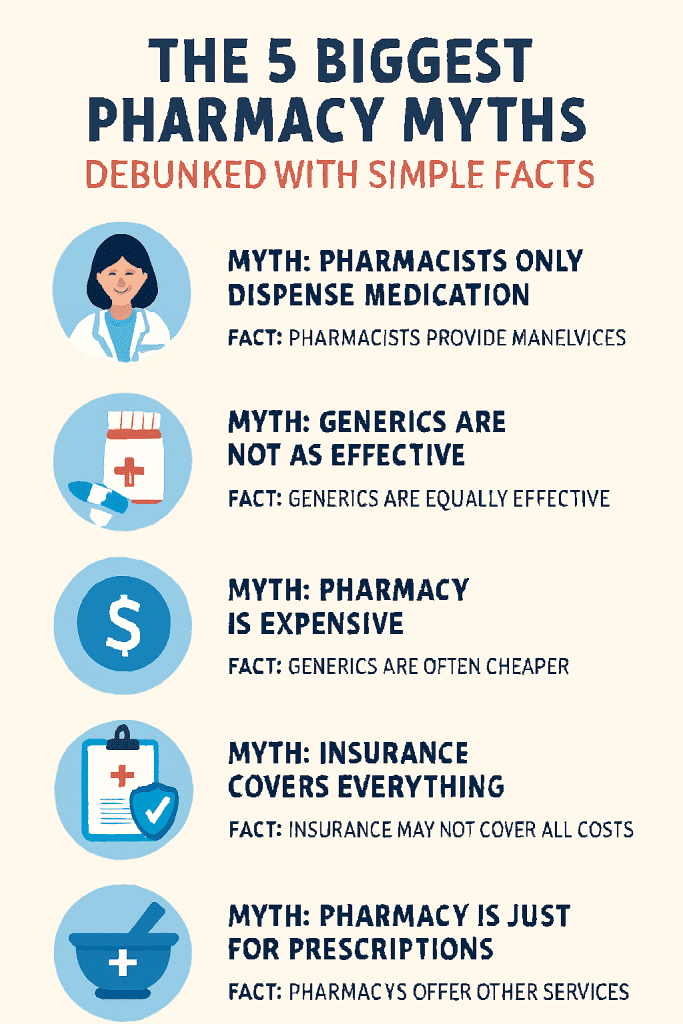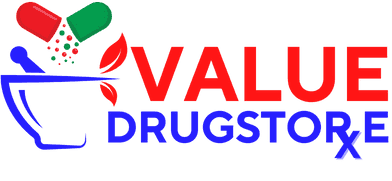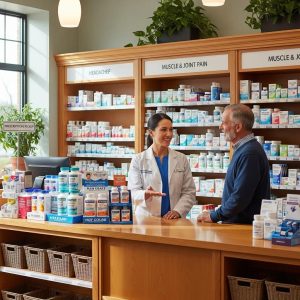
Concise Overview: Common misunderstandings about pharmacies can negatively impact your access to healthcare, how you manage your medications, and the health decisions you make. This article dispels five widespread myths about pharmacies, replacing them with clear, actionable facts to empower you to make informed and safer choices.
Table of Contents:
- Introduction: Why Understanding Pharmacy Myths is Crucial
- Myth #1: Pharmacists Are Just Pill Dispensers? Think Again!
- Myth #2: Generic Drugs – Are They Really Weaker Than Brand Names?
- Myth #3: Pharmacy Services Are Too Expensive: Unlocking Affordable Options
- Myth #4: My Insurance Covers Everything, Right? Pharmacy Coverage Realities
- Myth #5: Pharmacies Just Fill Prescriptions? Exploring Modern Pharmacy Services
- Bonus Myth: More Medication Equals More Relief? The Dosage Truth
- Empowering Your Healthcare Decisions: How to Navigate the Pharmacy World
- Conclusion: Partner with Your Pharmacist for Optimal Health
1. Introduction: Why Understanding Pharmacy Myths is Crucial
Pharmacies are critical access points within our healthcare system. They are often our first port of call when we need medication or health advice. Despite their accessibility and the vital role they play, misinformation about pharmacy services, medications, and associated costs is still prevalent. These myths can lead to missed opportunities for better care, create unnecessary expenses, and even pose potential health risks. Our goal is to directly confront and debunk these misconceptions, providing you with the truth.
In this article, we will meticulously dissect five persistent myths surrounding pharmacies and medications. For each myth, we will provide a counter-argument based on easily understandable facts, supported by expert insights, compelling evidence, and real-world examples. Whether you’re a patient, a caregiver, or even a healthcare professional, gaining a clear understanding of these facts will empower you to make better, more informed decisions and advocate effectively for yourself and others. Our primary aim is to equip you with accurate information, allowing you to confidently navigate the pharmacy landscape and make the best possible choices for your health.
2. Myth #1: Pharmacists Are Just Pill Dispensers? Think Again!
It is a surprisingly common misconception to believe that pharmacists are simply individuals who dispense prescriptions from behind a counter. This narrow view severely undervalues their extensive training, vast knowledge, and the multifaceted role they play in our healthcare. Pharmacists are highly skilled healthcare professionals who provide a comprehensive spectrum of essential services that extend far beyond just dispensing medications.
Expanded Service Offerings: Beyond the Pills
- Medication Therapy Optimization (MTO): Pharmacists meticulously analyze your entire medication regimen to ensure it is both safe and effective. They proactively identify and prevent potential drug interactions, considering all medications, including prescriptions, over-the-counter drugs, herbal supplements, and vitamins. Based on this comprehensive review, they can offer personalized recommendations to optimize therapeutic outcomes and minimize any adverse effects.
- Vaccination Services: Your Convenient Immunization Hub: Pharmacies now offer convenient access to a wide range of essential vaccinations. Beyond the familiar flu shots and COVID-19 vaccines, pharmacists often administer vaccines for shingles, pneumonia, tetanus, and other preventable diseases. This expanded access significantly boosts community immunization rates and contributes significantly to public health.
- Essential Health Screenings: Early Detection and Prevention: Pharmacies are increasingly offering basic, yet vital, health screenings, such as blood pressure, cholesterol, and glucose checks. These screenings provide valuable insights into your overall health, allowing for early identification of potential risks, which enables timely intervention and prevention strategies.
- Personalized Consultations: Your Medication Expert: Pharmacists are readily available to answer your questions and address any concerns you may have regarding your medications. They provide detailed information about potential side effects, appropriate dosages, alternative treatments, and address any medication-related questions you might have. This direct access to expert advice empowers you to make informed and confident health decisions.
- Chronic Condition Management: Supporting Your Long-Term Health: Pharmacists play a crucial role in managing chronic conditions like diabetes, asthma, and hypertension. They provide education on medication adherence, promote healthy lifestyle changes, and teach self-monitoring techniques to help patients effectively manage their conditions and improve their overall quality of life. They also actively collaborate with other healthcare providers to ensure coordinated and comprehensive care.
Pharmacists are often the first point of contact for identifying medication errors, providing essential patient education, and improving adherence to treatment plans. Their expertise, combined with their accessibility, makes them invaluable members of your healthcare team. Stop thinking of them as just pill dispensers; they are key allies in your journey to better health.
3. Myth #2: Generic Drugs – Are They Really Weaker Than Brand Names?
The belief that generic medications are somehow inferior to their brand-name counterparts is a common misconception, often fueled by branding and perceived price differences. It is crucial to understand that generic drugs are rigorously regulated and must adhere to strict standards to ensure their safety and effectiveness.
Key Aspects of Generic Medication Approval: Ensuring Quality
- Bioequivalence: The Gold Standard: Generic medications must demonstrate bioequivalence to their brand-name counterparts. This means they must be absorbed and utilized by the body in the same way and to the same extent as the original drug, guaranteeing the same therapeutic effect.
- FDA Scrutiny: Rigorous Testing and Approval: The Food and Drug Administration (FDA) rigorously tests and approves generic medications. This comprehensive process includes stringent quality control measures to ensure they are manufactured to the same high standards as brand-name drugs.
- Identical Active Compounds: The Core Ingredient: Generic drugs must contain the same active ingredients, strength, dosage form, and administration route as their brand-name counterparts. The only permissible differences are in inactive ingredients like fillers and coloring agents, which do not affect the drug’s therapeutic effects.
- Cost-Effective Savings: Saving Money Without Sacrificing Health: Generic medications are often significantly less expensive than brand-name drugs because manufacturers do not have to recoup the original research and development costs. This makes essential medications more affordable and accessible.
Choosing generic medications is a smart way to save money without sacrificing your health or the effectiveness of your treatment. Numerous studies consistently demonstrate their bioequivalence and therapeutic equivalence to brand-name drugs. Don’t fall for the myth; generic drugs are a safe and effective option.
4. Myth #3: Pharmacy Services Are Too Expensive: Unlocking Affordable Options
While the costs of medications can be a significant concern, pharmacies offer a variety of options and programs designed to make healthcare more affordable. Understanding these options can significantly help minimize your out-of-pocket expenses.
Ways to Save on Medications: Smart Strategies for Affordability
- Generic Alternatives: The Obvious Choice: As we discussed earlier, choosing generic versions of your medications can significantly reduce your costs without affecting their effectiveness.
- Pharmacy Loyalty Programs: Rewards for Your Health: Many pharmacies offer loyalty programs, discount cards, and other initiatives that provide discounts on prescription and over-the-counter medications. Take advantage of these programs to save money on your regular purchases.
- Manufacturer Discounts: Secret Savings: Drug companies often offer coupons and savings programs to help patients afford their medications. Your pharmacist can help you find and utilize these valuable resources.
- Affordable Medication Lists: Budget-Friendly Options: Some pharmacies offer a selection of commonly prescribed medications at a fixed, low price. These lists often include medications used to treat chronic conditions, providing significant savings.
- Price Comparisons: Shop Around for the Best Deal: Comparing prices at different pharmacies can help you find the best deals. Don’t hesitate to call around or use online tools to compare prices before filling your prescription. Some pharmacies may even match competitor’s prices.
- Prescription Assistance Programs (PAPs): Help for Those in Need: Many pharmaceutical companies and non-profit organizations offer PAPs to help low-income individuals access the medications they need. These programs may provide medications at no cost or at a significantly reduced price.
- Insurance Plan Review: Understand Your Coverage: Even if your insurance doesn’t fully cover all your medications, it can still significantly reduce your costs. Take the time to understand your plan’s formulary, copays, and deductibles to maximize your benefits.
5. Myth #4: My Insurance Covers Everything, Right? Pharmacy Coverage Realities
While health insurance is designed to help with healthcare costs, it doesn’t guarantee full coverage for all medications. Most plans have limitations, restrictions, and cost-sharing requirements that can significantly impact your out-of-pocket expenses.
Factors Influencing Coverage: Understanding the Fine Print
- Formularies: The List of Covered Drugs: Insurance plans have formularies, which are lists of covered drugs. If a medication isn’t on the list, it may not be covered, or it may have higher copays or coinsurance.
- Copays and Deductibles: Your Share of the Cost: Most plans require copays (a fixed amount you pay for each prescription) or deductibles (the amount you must pay before your coverage starts) for each prescription.
- Prior Approval: Getting the Green Light: Some medications require prior authorization from your insurance company, meaning your doctor must justify the medical necessity of the medication.
- Quantity Limits: Restrictions on Amounts: Plans may impose limits on the amount of certain medications you can get at one time.
- Step Therapy: Trying Cheaper Options First: Some plans require you to try a less expensive medication before covering a more expensive one, a process known as step therapy.
Understanding the details of your insurance plan and discussing your coverage with your pharmacist or doctor is essential. They can help you navigate the insurance landscape and explore alternatives if a medication isn’t covered or is too expensive. Don’t assume your insurance covers everything; be proactive and informed.
6. Myth #5: Pharmacies Just Fill Prescriptions? Exploring Modern Pharmacy Services
The traditional image of pharmacies as simply places to fill prescriptions and purchase over-the-counter (OTC) medications is outdated. Modern pharmacies are rapidly evolving into community health hubs that offer a wide range of services designed to improve your overall well-being.
Expanded Pharmacy Services: Beyond the Counter
- Immunizations: Protecting Against Preventable Diseases: As mentioned earlier, pharmacies offer a variety of vaccinations, making it easier than ever to protect yourself against preventable diseases.
- Health Screenings: Monitoring Your Health: Pharmacies provide convenient access to basic health screenings, such as blood pressure, cholesterol, and glucose checks, allowing you to monitor your health regularly.
- Medication Therapy Optimization (MTO): Enhancing Medication Regimens: Pharmacists provide comprehensive medication reviews and consultations to optimize medication regimens and prevent adverse drug events.
- Rapid Diagnostic Testing: Quick Answers: Some pharmacies offer rapid diagnostic testing for conditions like strep throat, influenza, and COVID-19, providing quick and convenient results.
- Wellness Programs: Promoting Healthy Lifestyles: Many pharmacies offer wellness programs and educational resources to help individuals adopt healthy lifestyle habits.
- Specialized Pharmacy Support: Tailored Care: Certain pharmacies specialize in providing medications and support services for patients with complex or chronic conditions.
- Remote Healthcare Options: Telehealth Integration: Pharmacies are increasingly integrating telehealth services, allowing patients to consult with healthcare providers remotely.
- Convenient Medication Delivery: Bringing Prescriptions to You: Many pharmacies offer home delivery, making it easier than ever to get your prescriptions filled.
- Custom Medication Solutions: Compounding Services: Certain pharmacies offer compounding services, which involve customizing medications to meet individual patient needs.
Modern pharmacies are evolving into integral parts of the healthcare ecosystem, offering a broader array of services and products to improve the health and well-being of the communities they serve. Don’t limit your view of pharmacies; they are much more than just prescription fillers.
7. Bonus Myth: More Medication Equals More Relief? The Dosage Truth
A particularly dangerous myth is that increasing your medication dosage beyond what’s prescribed will provide faster or more effective pain relief. This can lead to serious adverse effects, including overdose, liver damage, and other severe complications.
Importance of Following Dosage Instructions: Safety First
- Toxicity Risks: Protecting Your Organs: Exceeding the recommended dosage can lead to toxicity, which can damage your organs and cause serious health problems.
- Drug Interaction Risks: Avoiding Dangerous Combinations: Taking more medication than prescribed significantly increases the risk of dangerous or even fatal drug interactions.
- Addiction Dangers: Preventing Dependence: Misusing pain medications can lead to addiction and dependence.
- Symptom Masking: Hiding Underlying Problems: Overdosing can mask underlying medical conditions, making accurate diagnosis and effective treatment more difficult.
Always follow the dosage instructions provided by your doctor or pharmacist. If you are experiencing severe pain, consult your healthcare provider for alternative treatments or medication adjustments. Never self-medicate or exceed the recommended dosage of any medication. Your health and safety depend on it.
8. Empowering Your Healthcare Decisions: How to Navigate the Pharmacy World
Understanding these myths empowers you to actively manage your health and interact more effectively with your pharmacy.
- Ask Detailed Questions: Be Inquisitive: Don’t hesitate to ask your pharmacist detailed questions about your medications, potential side effects, alternative options, and insurance coverage.
- Maximize Savings: Be Resourceful: Explore generic options and pharmacy discount programs to reduce your costs.
- Prioritize Safety: Be Responsible: Always follow dosage instructions carefully and avoid self-medicating.
- Access Comprehensive Care: Be Proactive: Utilize the full range of services offered by modern pharmacies, including immunizations, health screenings, and medication therapy optimization.
9. Conclusion: Partner with Your Pharmacist for Optimal Health
Pharmacists are highly trained and readily accessible healthcare professionals who play a vital role in your health journey. By debunking these common myths, we hope to empower you to make smarter choices, save money, and prioritize your health and well-being. Partner with your pharmacist; they are a valuable resource for achieving optimal health.



